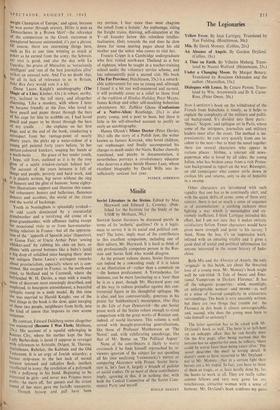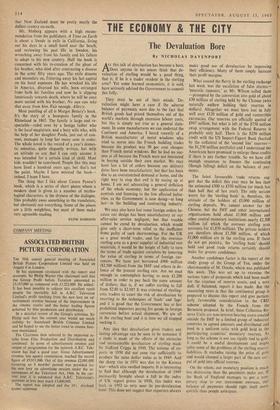The Legionaries
An Absence of Angels. By Gordon Dryland. (Collins, 18s.) Under a Changing Moon. By Margot Benary. Translated by Rosaleen Ockenden and the author. (Macmillan, I5s.) Dialogues with Leuco. By Cesare Pavese. Trans- lated by Wm. Arrowsmith and D. S. Carne- Ross. (Peter Owen, 30s.) JEAN LARTEouv's book on the withdrawal of the French from Indochina is timely, as it helps to explain the complexity of the military and politi- cal background. It's divided into three parts: 'Hanoi,' Saigon,' and epilogue set in Paris, where some of the intriguers, journalists and military leaders meet after the event. The method is im- pressionistic; he cuts very quickly from one in- cident to the next—but to bind the novel together there are several characters who appear in various places: Jerome, a tolerant old news- paperman who is loved by all sides; the young Julien, who has 'broken away from a rich Protes- tant background to report on the war; Rdsengier, an old campaigner who cannot settle down in civilian life and returns, only to die of hepatitis in a swamp.
Other characters are introduced with such rapidity that one has to be continually alert, and with the quick shifts of scene, some of them very sinister, there is not so much a sense of sequence as of accumulation: a seething inchoate mass fighting a war which is meaningless and ex- tremely inefficient. I think Larteguy intended this effect, but I am not sure that it makes entirely satisfactory fiction. Fewer characters would have given more strength and point to his survey, I think. None the less, it's an impressive work, infused with an amazing vitality and it gives a good deal of social and political information for anyone interested in the recent history of Indo- china.
Both Atia and An Absence of Angels, the only 'originals' in this batch, are about the thwarted love of a young man. Mr. Monsey's book might well be sub-titled `A Tale of Incest and Emo- tional Vampirism in Darkest Florence.' It has all the telegenic properties: wind, moonlight, an unforgettable woman—and DESIRE—as well as a sense of fevered complicity in aristocratic surroundings. The book is very smoothly written, but there are two things that trouble me: the Florence in this book is almost unrecognisable. and, second, why does the young man have to take himself so seriously?
The latter question has to be asked with Mr. Dryland's book as well. The hero is so hell-bent on an unhappy affair that he can hardly miss. On the first page, after being warned that the heroine has an appetite for men, he reflects, 'there could be worse fates than being eaten alive.' The novel describes the meal in loving detail. It doesn't seem to have occurred to Mr. Dryland- nor to Mr. Monsey- that in a certain light their heroes are a bit stupid. In fact, you have to think of them as tragic, or at least hardly done by, for the books to work at all. They are really rather solemn fellows and very easy game for any mischievous, attractive woman with a sense of humour. Mr. Dryland's book confirms my guess
that New Zealand must be pretty nearly the dullest country on earth.
Mr. Moberg appears with a high recom- mendation from the publishers. A Time on Earth is about a Swede in exile in California, living out his days in a small hotel near the beach, and reviewing his past life in Sweden, his wrenching away from his family and his failure to adapt to his new country. Half the book is concerned with his re-creation of the ghost of his brother, who died after contracting a disease in the army fifty years ago. The exile dreams and maunders on, frittering away his last capital on his hotel expenses. He has wrecked his life in America, divorced his wife, been estranged from both his families and now he is slipping luxuriously towards death, where he will be once more united with his brother. No one can take that away from him. Fair enough. A!!ez-y.
Most puzzling of all is Margot Benary's book. It's the story of a bourgeois family in the Rhineland in 1865. The family is large and re- spectable—ruled over by a benign father who is the local magistrate, and a busy wife who, with the help of her daughter Paula, just out of con- vent, manages to keep her many sons in order. The whole novel is the record of a year's domes- tic minutiae, quite elegantly written, but with an attitude so coy that I can only assume it was intended for a certain kind of child. Most kids wouldn't be convinced. People like this may have lived a hundred years ago, but that's not the point. Maybe I have misread the book— indeed, I hope 'I have.
The thing that I like about Cesare Pavese's book, which is a series of short pieces where,a modern slant is given to a number of mytho- logical characters, is the dryness of the dialogue. This probably owes something to the translators, but obviously not everything. Some of the pieces are a little weightless, but most of them make very agreeable reading.
KEITH HARRISON































 Previous page
Previous page